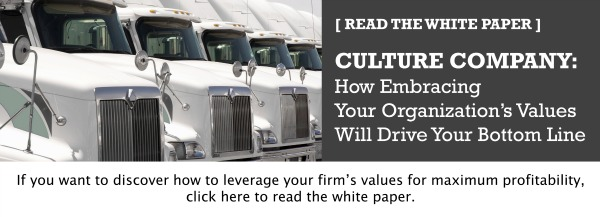 CHRIS TANKE, HNI Transportation Practice Leader & Associate Vice President
CHRIS TANKE, HNI Transportation Practice Leader & Associate Vice President
& BRIAN KAMINSKI, HNI Account Executive
In the transportation industry, Culture Companies have figured out that balance between Safety and Operations and are constantly monitoring to make sure both are working correctly.
Leading and lagging metrics are tracked and managed daily. Drivers and managers receive regular, objective feedback based on performance — feedback that’s not based on popularity contests as judged by dispatchers.
Drivers at Culture Companies have clear expectations on which team members are held accountable for what metrics. At some Culture Companies, we have seen drivers holding their peers accountable as a regular course of business.
Discipline and rewards are consistent so drivers know exactly what to expect. A Culture Company’s culture of safety is not a priority but a value of the company. These corporate core values start in the C-suite and filter down.
Let's dive deeper into what makes a Culture Company stand apart from its peers.
Messages are Clear
The funny thing is that building a strong culture can be very inexpensive. Additional staff or new equipment is not necessary. The key to success really hinges on being consistent in everything you do.
Messages are clear. Discipline and enforcement of policy is consistent. In other words, Culture Companies treat employees like responsible adults — and not like children who don’t understand consequences.
In a Culture Company, one person no longer manages safety. Everyone is on board managing safety and making decisions based on corporate core values.
This culture typically results in lower accident and injury incidence, which results in lower insurance cost. And lower insurance cost clears the way for more profit.
These companies very rarely have FMCSA issues because their value is to operate to the letter and spirit of the law.
Corporate Core Values as a Compass
Culture Companies survive and thrive in every situation. The efficiencies in these companies consistently provide profit.
Profit, of course, yields some head-turning side effects. Profit means that companies can provide quality equipment and be selective on freight hauled. Drivers make more money and appreciate the ownership that they earn over their driving career. Culture Companies don’t struggle for drivers and can afford to make the correct hiring decisions.
Being consistent is where most organizations fail in building their culture. When an employee makes a mistake or has an accident, it’s usually because the employee made a poor decision — they've failed to practice corporate core values.
Employers tend to rationalize or accommodate the poor decision because “good” employees are hard to come by. We all know that consistently accommodating someone else’s poor decision-making yields poor results both in the short and long term. And the harder you look at it, maybe that “good” employee isn’t so “good” after all.
How do you see corporate core values in action at your organization? Please share in comments!
Related Posts:
Tracy Morgan Crash Shines Spotlight on Culture of Safety in Trucking
Drivers Hold Keys to Strengthening Your Culture Through Ownership
The Importance of Corporate Culture: A Tale of Two Companies
Employee Risk Management: What It Is and Why It Matters
.png?width=69&height=53&name=Acrisure%20Logo%20(White%20Horizontal).png)

 CHRIS
CHRIS 
